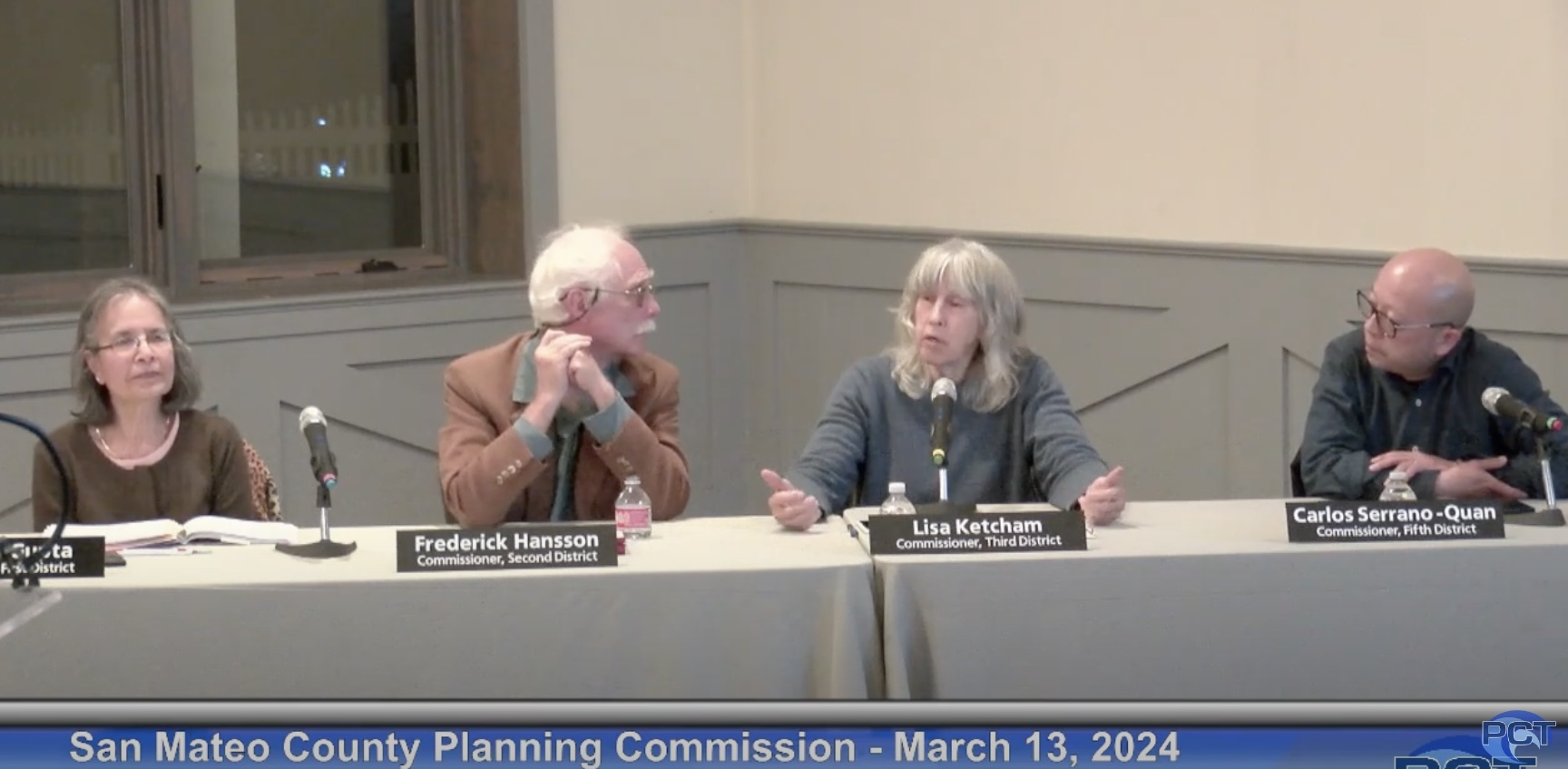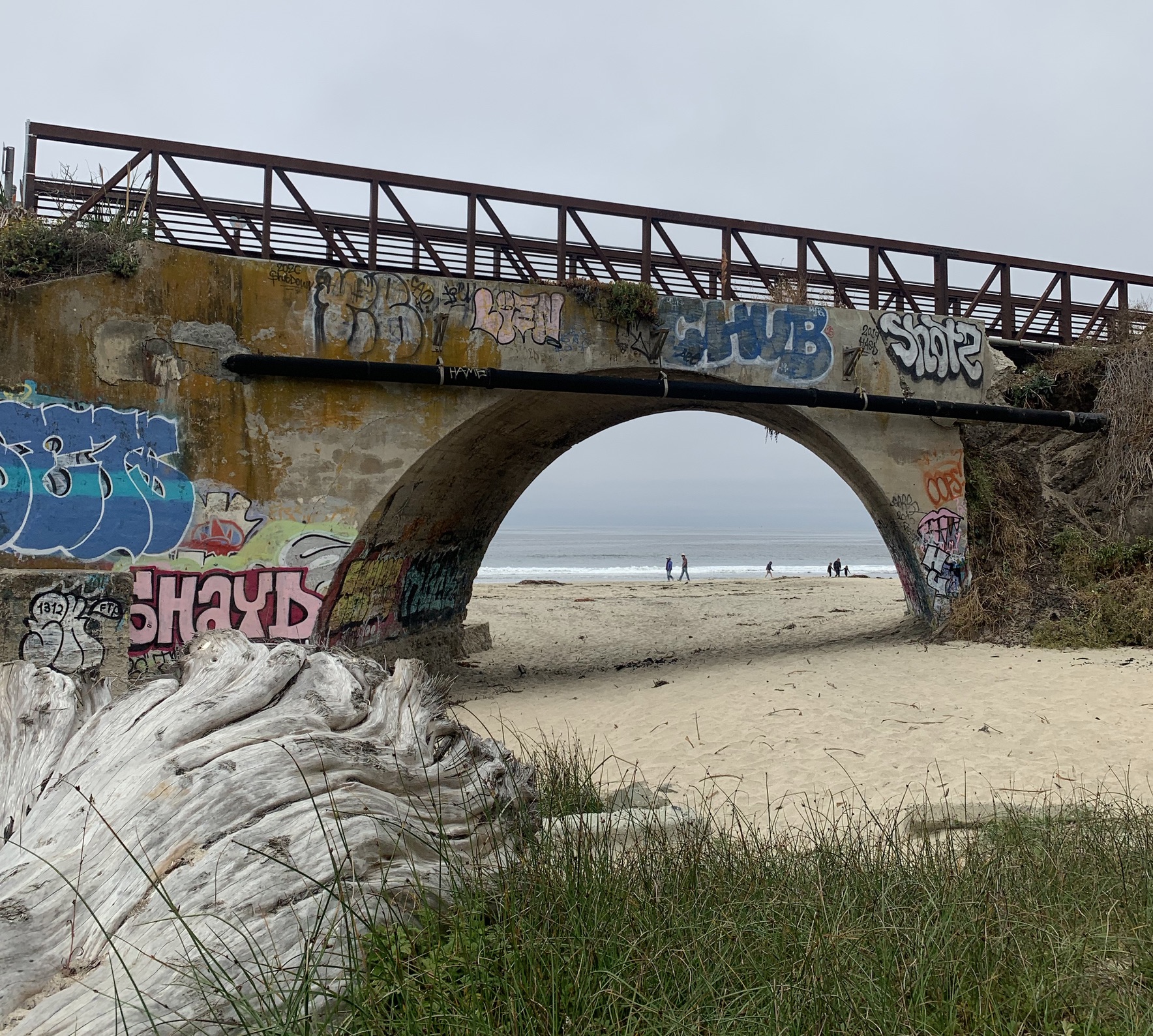|
Getting your Trinity Audio player ready...
|
VIDEO. From the San Mateo County Planning Commission regular meeting on Wednesday, March 13th, 2024 at 6:00pm, in person, at the Oceano Hotel Gate House.
Cypress Point Housing AB 1449 Exemption from CEQA Process Brings the San Mateo County Planning Commission to the Coastside to Explain
Wed. March 13th @ 6:00pm – 9:00pm
VIDEO. From the San Mateo County Planning Commission meeting on February 28th, 2024 at 9:00am as a hybrid meeting. San Mateo County Planning Director, Steve Monowitz, reports.
VIDEO. From the Midcoast Community Council (MCC) regular meeting on Wednesday, February 28th, 2024 at 7:00pm, as a hybrid meeting. In person only.
MCC council member, Ann Rothman, dug in deep with some really good legal questions and examples of non-conformity to AB 1449 for the Cypress Point Housing location.
Coming Info Drops/Process
- Friday 3/1/2024. A Memo from San Mateo County Planning Director, Steve Monowitz, will explain the changes in permitting process due to AB 1449. He will also provide comments to Draft EIR. Posted here.
- Thursday 3/7/2024. A Staff Report will be posted no later than March 7th, 2024. Posted here.
- Wednesday 3/13/2024; 6:00pm to 9:00pm. Don’t Miss SMCo Planning Commission on the new Cypress Point AB 1449 CEQA Exemption at Oceano Gate House. In person only. Single Item agenda. Agenda will be posted here.
More on Cypress Point Housing Project on Coastside Buzz
More on the MCC on Coastside Buzz
San Mateo County Plannning Commission
- Frederick Hansson
Representing
Second District - Carlos Serrano-Quan
Partial Term
Jun 28, 2022 to Dec 31, 2024Title
MemberRepresenting
Fifth District - Manuel Ramirez Jr.
2nd Term
Jan 01, 2021 to Dec 31, 2024Title
MemberRepresenting
Fourth District - Kumkum Gupta
1st Term
Jan 01, 2021 to Dec 31, 2024Title
MemberRepresenting
First District - Lisa Ketcham
2nd Term
Jan 01, 2023 to Dec 31, 2026Title
MemberRepresenting
Third District - Steven Monowitz
No Term
N/A N/ATitle
StaffRepresenting
Community Development Director - Diana Shu
No Term
N/A N/ATitle
StaffRepresenting
Department of Public Works
2024 Election
The 2024 Board of Supervisors, from left: Ray Mueller (D3), Noelia Corzo (D2) Warren Slocum (D4, BOS President), David J. Canepa (D5, BOS Vice President) and Dave Pine (D1, outgoing BOS President).
MCC Agendas, Videos and Lots and Lots of Documents!
Thanks to exMCC’s Lisa Ketcham (now on the San Mateo County Planning Commission) for an incredibly well curated website archive on local planning issues.
Link to MCC Virtual Meetings
Midcoast Community Council Website
Midcoast Community Council (MCC) is an elected Municipal Advisory Council to the San Mateo County Board of Supervisors, representing Montara, Moss Beach, El Granada, Princeton, and Miramar.
Regular MCC meetings are on the 2nd & 4th Wednesday of the month at 7:00 PM at Granada Community Services District (GCSD) meeting room, 504 Ave Alhambra, third floor, El Granada. All MCC meetings are open to the public, and are agendized and posted according to the requirements of the Brown Act.

Agenda item supporting documents are available 72 hours in advance of meetings on http://www.MidcoastCommunityCouncil.org.
Minutes from previous meetings on http://www.midcoastcommunitycouncil.org/2017-2018/
To subscribe to MCC agendas via email, send email to MCC-Agendas+subscribe@googlegroups.com
Midcoast Community Councilmembers
MCC: midcoastcommunitycouncil@gmail.com
P.O. Box 248, Moss Beach, CA 94038
Subscribe to agendas via email: Google Group-MCC-Agendas.
Gregg Dieguez, Chair – Term Ends: Dec. 2024
Phone: 650-544-0714
Email: MCCGreggD@gmail.com
Claire Toutant, Vice Chair – Term Ends: Dec. 2026
Phone: 650-676-5847
Email: midcoast.claire@gmail.com
Scott Bollinger, Secretary – Term Ends: Dec 2026
Phone: 650-773-4425
Email: scottbollingerMCC@gmail.com
Dan Haggerty, Treasurer – Term Ends: Dec. 2024
Phone: 650-212-6026
Email : midcoastdan@gmail.com
Gus Mattammal, Member – Term Ends: Dec 2026
Phone: 650-451-5335
Email: midcoastgus@gmail.com
Vacancy for term ending 2026
Vacancy for term ending 2024












The fix is in on this one. The vote of the Planning Commission last week was pitiful, with no serious discussion of the many real-world specific issues raised in testimony and letters. The many specific disqualifications from the language of AB1449 noted in the letter from the MCC and the testimony of Ann Rothman and others–a bill passed at the state level to exempt certain so-called “affordable housing” projects from CEQA and being used inappropriately by San Mateo County to get around a CEQA review–were ignored by the commissioners. The reverse-racist tropes and dog whistles used in testimony by several Spanish speakers (who, I strongly suspect, had the words fed to them) were disgusting to those who know how such things are played–much like how developmentally disabled young people were misused to get sympathy for Big Wave.
Overlooked is the fact that that any people eventually moving into this project will have to deal with the same degraded transportation and safety environment as the existing neighborhood and travelers that will be harmed by the spillovers from the development. And no single families in the income ranges required will be able to afford units, anyway, once their vehicle and commuting costs (there are no jobs in the area), water, sewer, utilities, etc., are added on to their rents. So there will be, inevitably, multiple families crowded into the units that will far exceed the planned population, number of vehicles, water usage, and other numbers being used in the railroading of the project. There are no contingency plans for when such things happen, as they have already happened elsewhere on the coastside.
So who will benefit from this mess? All people need a healthy, safe place to live with a modicum of stability and dignity. No longer able to use the “urban redevelopment” scam during which many millions of dollars were flushed down contrived rabbit holes without improvement to the lives of lower-income people (and often destroying the communities of those same people), politicians have now developed a new feel-good replacement called “affordable housing.” Politicians can say they are doing something about the affordability problem. Government staff jobs are created or enlarged to shepherd the projects. Nonprofits or private developers spearheading the new housing gain financially and in societal power and authority. Builders and the suppliers of materials make money. Almost everyone else loses.